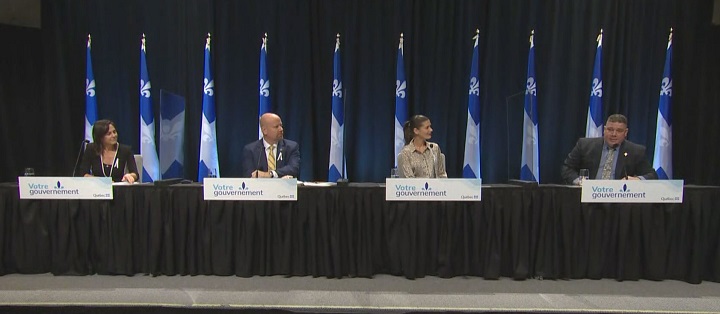The Quebec government announced new measures Friday aimed not only at improving training and police practices in Indigenous communities but also preventing violence experienced by Indigenous women and girls.

“My colleagues and I want to improve the way we intervene with members of the First Nations and Inuit, in particular with regard to women and girls who are too often victims of violence, who are too often vulnerable,” said Indigenous Affairs Minister Ian Lafrenière during a press conference in Quebec City.
“The needs are great and we will allocate the necessary resources,” he said, adding the government was investing over $18 million in a five-year plan dubbed “J’ai espoir” or I have hope.
The action plan stems from recommendations issued in the Viens Commission and Murdered and Missing Women and Girls report, as well as a report released Thursday on the sexual exploitation of minors in Quebec.
Several of the measures put forward by the Ministry of Public Security aim to strengthen Indigenous police forces.
More than $4.1 million will go towards carrying out a joint status report on Indigenous police forces in Quebec and to financially support the First Nations Chiefs of Police Association (FNCPA).
Public Security Minister Geneviève Guilbault said an assessment is necessary in order to better address specific needs.
“We will be able to determine what the needs are and what is the best course of action to ensure we have a service that is adapted and culturally safe for the communities,” she said.
The government is also trying to improve accessibility to police training programs and will offer bursaries to 24 First Nations or Inuit students per year at the Quebec police school in Nicolet.
Currently, only 3.5 per cent of graduates of the school are Indigenous, according to Guilbault. “We want to increase that,” she said.

Get breaking National news
The government says it will be a big aid for young men and women who don’t choose to become police officers due to financial obstacles.
The government will also provide Indigenous police forces with training on dealing with domestic and sexual violence which is already being offered to other Quebec police forces.

Shawn Dulude, the chief of the Akwesasne Mohawk Police Service and a vice-president of the First Nations Chiefs of Police Association, said that many of Quebec’s 22 Indigenous police services are small.
A service with four or five officers can’t afford to send one of them away for up to a month, he explained at the press conference.
The government will look at ways to deliver the training in communities, and in the languages that Indigenous police officers speak, Guilbault added.
Dulude said the training will allow Indigenous police services to investigate crimes such as sexual assaults in their communities without having to call for support from the provincial police. “We want to be equal” with other police services, he said.
Funding will also be made available to provide cultural sensitivity training to correctional services agents, including probation officers.

Dulude thanked the government for the assistance saying it would ensure the sustainability of Indigenous police forces.
He, noted, however, that several challenges still lie ahead especially when it comes to retaining local police officers in small communities.
“Knowing the police officer, building a rapport, trusting them is helpful, but also being an officer and knowing everybody, being related often to a great portion of the community you are policing comes with obstacles,” Dulude said.
As an example, he cited being called to a domestic abuse situation where to victim or suspect is a close relative.
“You can’t say you’re going to give the call to somebody else because there is nobody else. Often you’re alone with your partner working that shift,” he said adding that often officers chose to leave their community and join a police force elsewhere to avoid the stress that can lead to burnouts.
Dulude also said Indigenous police forces can’t compete with provincial police or forces in bigger cities that can offer better financial incentives be it in terms of salaries, benefits or pensions.
Dulude said he’s optimistic about future negotiations with Quebec City and Ottawa around funding. Currently, Indigenous police services in Quebec receive 52 per cent of their funding from the federal government and 48 per cent from the province.
–With files from The Canadian Press’ Jacob Serebin








Comments